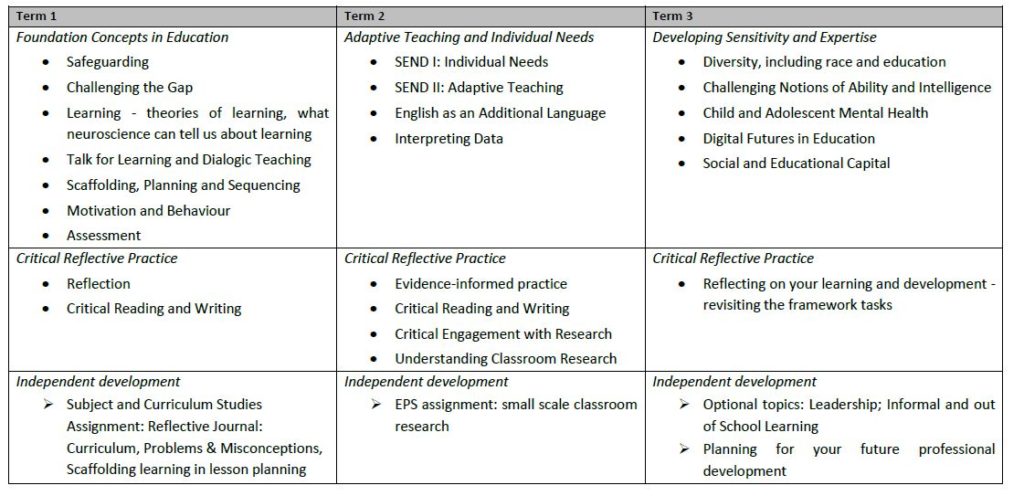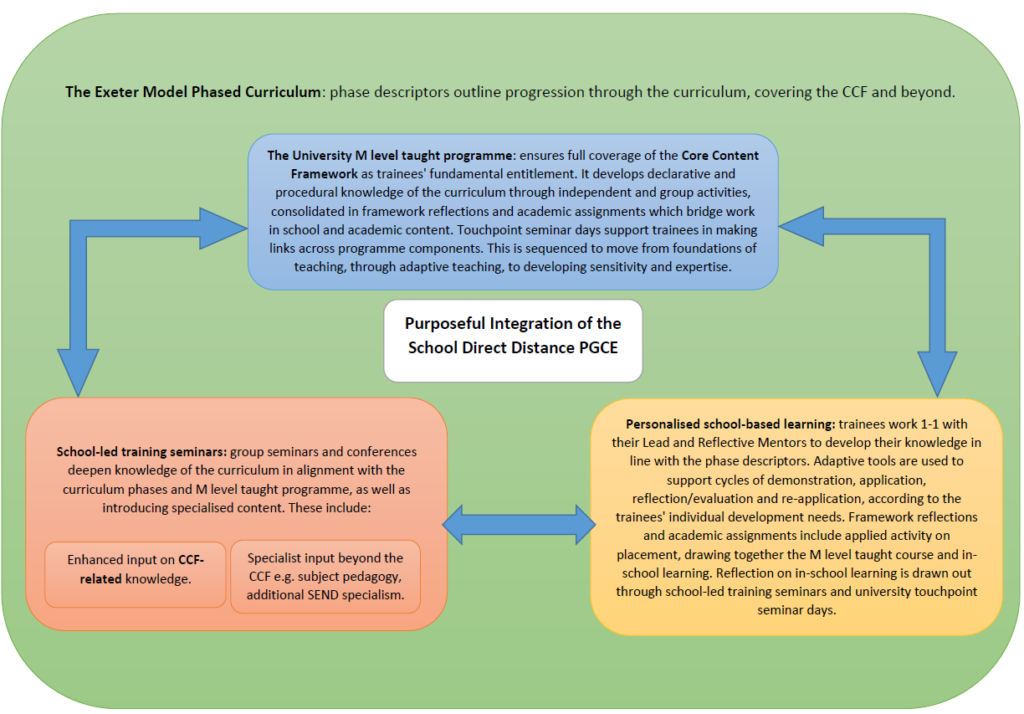The trainee curriculum is founded on the phases of development. Trainees move from Anticipating Practice, through Beginning Practice, Consolidating Practice, Developing Independence and (in some cases) Extension and Enrichment. Each phase has a descriptor (in the Programme Handbook and the IDP). These outline the declarative (know that) and procedural (know how) knowledge that trainees are expected to develop in each phase. These descriptors define the content of the curriculum.
Progress through the phases is assessed via Formative Reflections on Achievement and Progress (FRAPs).
The curriculum incorporates the DfE mandated Core Content Framework for ITT which forms a ‘minimum entitlement’ for trainees, but goes significantly beyond it.
The curriculum is sequenced to interweave development of declarative knowledge (through school and university-led seminars and online learning) with procedural application in classroom practice. The topics that we cover in the credit-bearing university modules introduce core concepts. These are sequenced by term, moving from foundation concepts towards adaptive expertise. Trainee’s understanding of how to engage critically with research and to develop their reflective practice is also sequenced through a termly progression which starts with reading and reflecting on research, then moves into developing confidence in conducting their own research.

Alongside the core university input, each trainee will have an individual training plan devised by their Lead School. This should include information about subject specific pedagogical training, which Lead Mentors will usually be expected to support. Please ensure that you and your trainee have talked through their school-led training plan.

Intent: Primary School Direct Distance PGCE Programme Values and Beliefs
All children deserve to be able to access, participate in and engage with learning, and have the best possible experience of education. We know that good teachers are at the heart of this. With this in mind, we aim to develop critically reflective teachers – able to challenge existing assumptions (including their own) in order to adapt and develop their practice to meet the changing needs of their pupils. Our programme is designed to enable you to understand and interrogate the principles of teaching and learning which lie beneath practice, so that you can make informed choices in your own practice. We aim to develop your confidence in engaging with research by helping you to understand and interpret research findings, and also through direct experience of undertaking small-scale, applied research. Through this, we support you in developing agency: becoming adaptable, informed and passionate about pupil learning. The Primary School Direct Distance PGCE programme is designed to enable you to develop your pedagogical subject knowledge across the secondary curriculum as well as developing your understanding of wider issues in education so that you are prepared to join a wide community of teachers making a positive contribution to schools and a difference to children’s lives.
Our curriculum does not separate out the Teachers’ Standards and address them one by one. This is because we recognise how interrelated many of the standards are, and that trainees will be constantly developing understanding and skills across all of the standards.
We support progress towards the standards through our phases. There are different expectations within each phase – for example, of how much classroom contact time trainees have, or which training tools they use to evaluate and reflect. This scaffolds progress in a gradual sequence which moves towards independent practice.
The ‘profile descriptor’ of each phase describes the knowledge, understanding and skills that we expect trainees to be able to demonstrate at the end of it. The movement through the phases is flexible, depending on trainee needs. Meeting the ‘Developing Independence’ phase indicates that trainees have met the standards required for the award of QTS.
You will find the phase profile descriptors in the IDP and in the programme handbook. Trainees’ progress will be formatively assessed against the profile descriptors through the Formative Reflection on Achievement and Progress (FRAP) process.
The Department for Education has published recommended ‘Core Content’ for Initial Teacher Training which offers a framework which should be considered a “minimum entitlement” for all trainees, presenting the content atomistically against each standard: https://www.gov.uk/government/publications/initial-teacher-training-itt-core-content-framework. In the module guide below, there is a table which presents the DfE core content, and shows the key areas where we integrate this information into our course – through topics, tasks, assignments and seminars. The table also indicates some of the ways in which our course goes beyond this minimum entitlement, outlining some additional ideas that trainees explore.
As well as the Core Content Framework map, this contains detailed information about the university taught course elements of the programme.